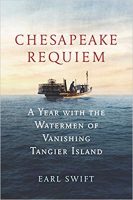 There was an email from The New York Times in my inbox this morning headed: “Climate: The most important story of our time.” It’s a story that’s certainly receiving some attention this week in Britain, thanks to the demonstrations by Extinction Rebellion in London and last night’s BBC1 programme presented by David Attenborough, Climate Change — The Facts. During that programme, a campaigner representing Gulf Coast communities declared that people of that region could become “the first climate-change refugees” in the United States.
There was an email from The New York Times in my inbox this morning headed: “Climate: The most important story of our time.” It’s a story that’s certainly receiving some attention this week in Britain, thanks to the demonstrations by Extinction Rebellion in London and last night’s BBC1 programme presented by David Attenborough, Climate Change — The Facts. During that programme, a campaigner representing Gulf Coast communities declared that people of that region could become “the first climate-change refugees” in the United States.
Equally endangered is a settlement in the middle of America’s largest estuary, the Chesapeake Bay — the subject of Earl Swift’s Chesapeake Requiem, published in the US towards the end of last year. Swift’s is a story of a small and singular place seeing changes that will soon affect the whole world. At the broadest point of the bay, “at the mercy of nature’s wildest whims”, sits Tangier Island, whose inhabitants for generations have harvested crabs and oysters. The very water that sustains their community — one of 470 conservative and deeply religious people — is also slowly erasing it. Scientists say that the island, which has lost two thirds of its land since 1850, could become the first American town to fall victim to rising sea levels caused by climate change; the locals say the problem is erosion — and they have been told anyway by Donald Trump, who is hugely popular on Tangier, that there is no reason to worry. Swift lived among the islanders, and his account, at once affectionate and inquiring, is a superb piece of reporting. If you have any interest in writing about place and/or climate change, you ought to read it.

Leave a Reply